Business Law (PACC 6009) Case Study Analysis: Semester 1, 2019
VerifiedAdded on 2023/03/17
|8
|2172
|23
Case Study
AI Summary
This case study analysis examines a scenario involving a professional gamer, Zach Coventry, and a hardware supplier, Handy Hardware Supplies (HH). Zach purchased a gaming PC from HH, but the performance was unsatisfactory, leading to issues in an online gaming competition. The analysis addresses whether Zach has grounds for legal action against HH, focusing on contract law principles such as the distinction between contract terms and representations, exclusion clauses, and unconscionable conduct. The analysis considers the applicability of the 'puff' representation, the terms of the phone conversation, and the impact of the exclusion clause in the contract. The case study concludes that Zach may be entitled to monetary compensation for the defective PC and the overpriced CPU due to unconscionable conduct. However, his claim for consequential damages, such as the loss in the competition, might be unsuccessful due to remoteness. The analysis references relevant case law to support the arguments and conclusions.
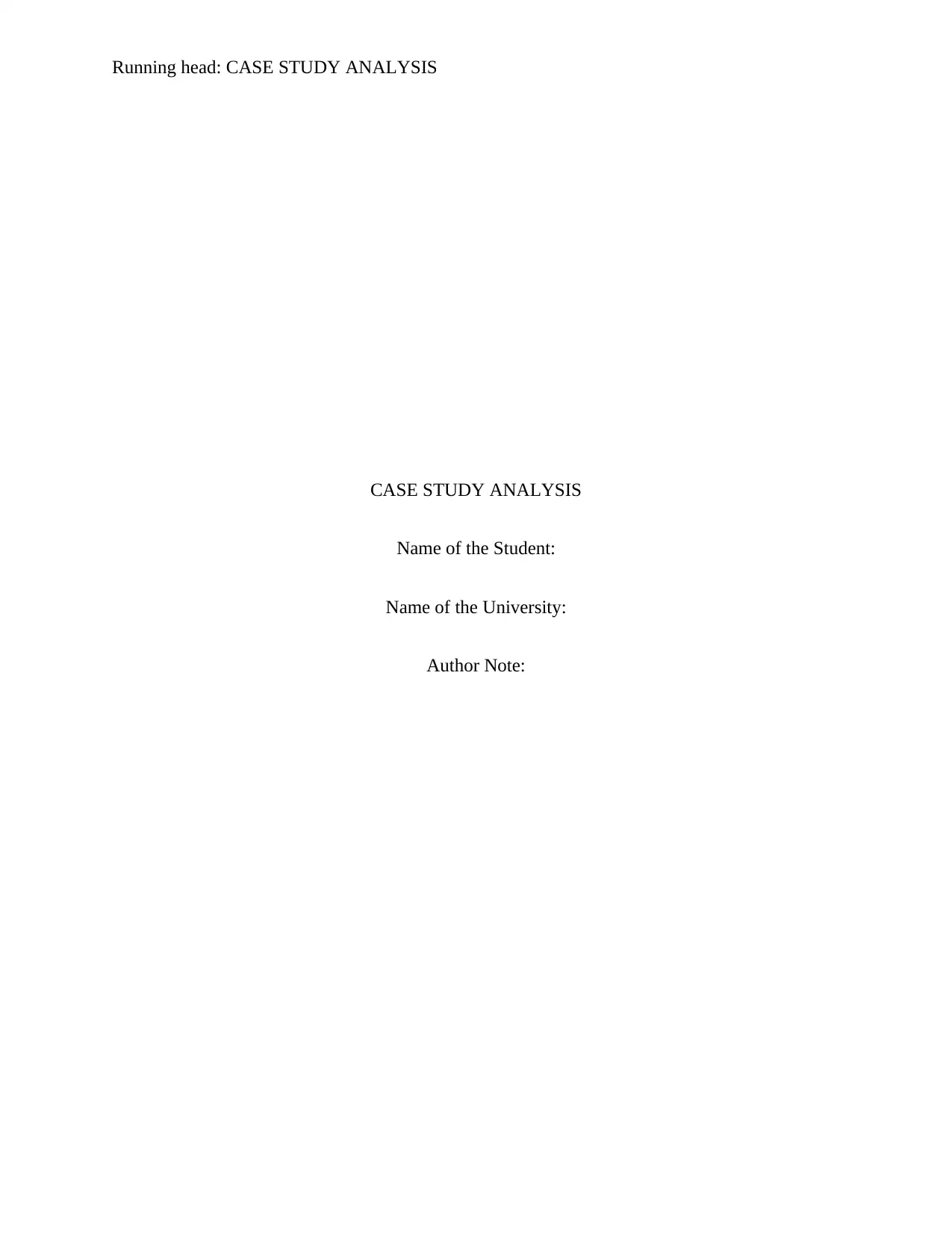
Running head: CASE STUDY ANALYSIS
CASE STUDY ANALYSIS
Name of the Student:
Name of the University:
Author Note:
CASE STUDY ANALYSIS
Name of the Student:
Name of the University:
Author Note:
Paraphrase This Document
Need a fresh take? Get an instant paraphrase of this document with our AI Paraphraser
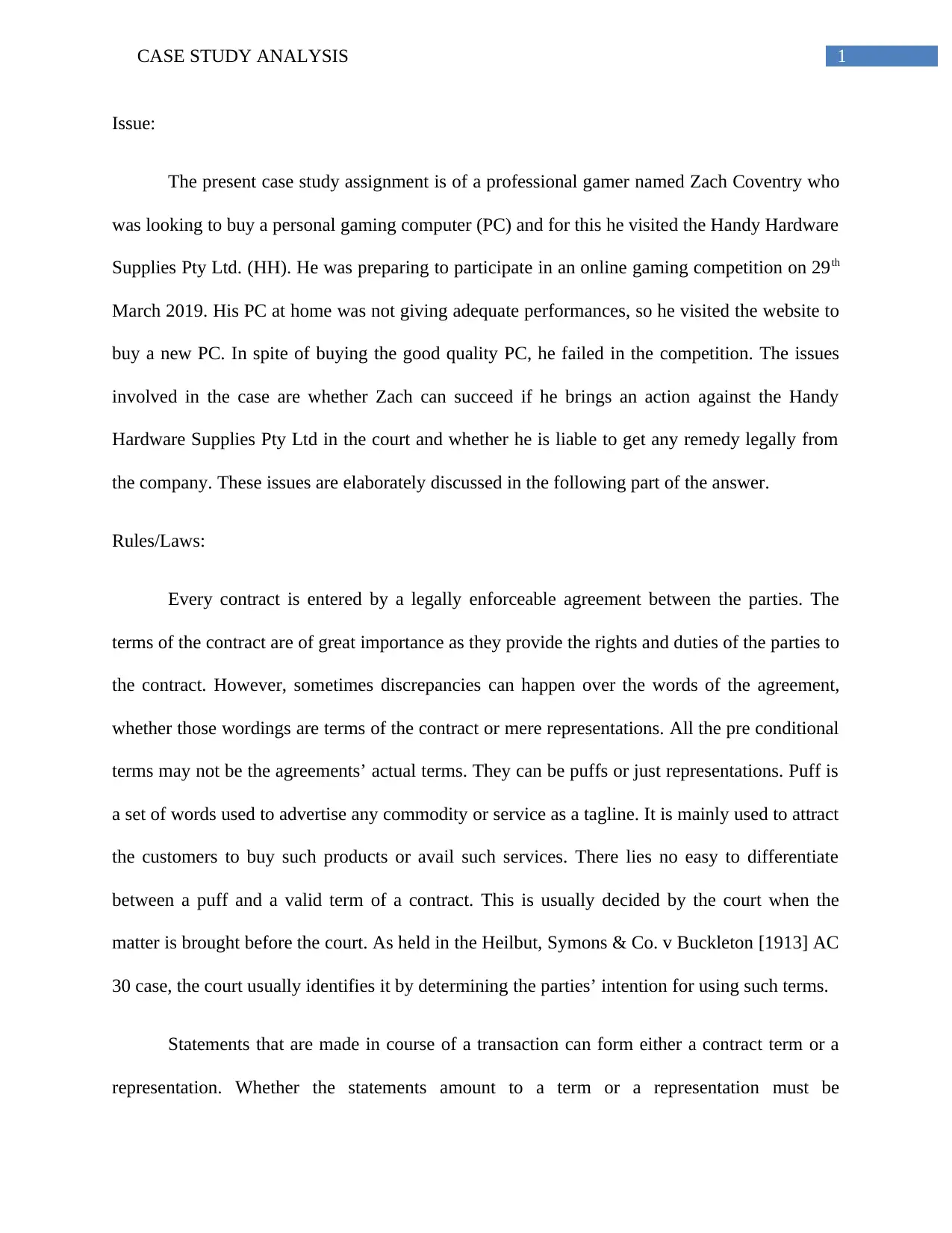
1CASE STUDY ANALYSIS
Issue:
The present case study assignment is of a professional gamer named Zach Coventry who
was looking to buy a personal gaming computer (PC) and for this he visited the Handy Hardware
Supplies Pty Ltd. (HH). He was preparing to participate in an online gaming competition on 29th
March 2019. His PC at home was not giving adequate performances, so he visited the website to
buy a new PC. In spite of buying the good quality PC, he failed in the competition. The issues
involved in the case are whether Zach can succeed if he brings an action against the Handy
Hardware Supplies Pty Ltd in the court and whether he is liable to get any remedy legally from
the company. These issues are elaborately discussed in the following part of the answer.
Rules/Laws:
Every contract is entered by a legally enforceable agreement between the parties. The
terms of the contract are of great importance as they provide the rights and duties of the parties to
the contract. However, sometimes discrepancies can happen over the words of the agreement,
whether those wordings are terms of the contract or mere representations. All the pre conditional
terms may not be the agreements’ actual terms. They can be puffs or just representations. Puff is
a set of words used to advertise any commodity or service as a tagline. It is mainly used to attract
the customers to buy such products or avail such services. There lies no easy to differentiate
between a puff and a valid term of a contract. This is usually decided by the court when the
matter is brought before the court. As held in the Heilbut, Symons & Co. v Buckleton [1913] AC
30 case, the court usually identifies it by determining the parties’ intention for using such terms.
Statements that are made in course of a transaction can form either a contract term or a
representation. Whether the statements amount to a term or a representation must be
Issue:
The present case study assignment is of a professional gamer named Zach Coventry who
was looking to buy a personal gaming computer (PC) and for this he visited the Handy Hardware
Supplies Pty Ltd. (HH). He was preparing to participate in an online gaming competition on 29th
March 2019. His PC at home was not giving adequate performances, so he visited the website to
buy a new PC. In spite of buying the good quality PC, he failed in the competition. The issues
involved in the case are whether Zach can succeed if he brings an action against the Handy
Hardware Supplies Pty Ltd in the court and whether he is liable to get any remedy legally from
the company. These issues are elaborately discussed in the following part of the answer.
Rules/Laws:
Every contract is entered by a legally enforceable agreement between the parties. The
terms of the contract are of great importance as they provide the rights and duties of the parties to
the contract. However, sometimes discrepancies can happen over the words of the agreement,
whether those wordings are terms of the contract or mere representations. All the pre conditional
terms may not be the agreements’ actual terms. They can be puffs or just representations. Puff is
a set of words used to advertise any commodity or service as a tagline. It is mainly used to attract
the customers to buy such products or avail such services. There lies no easy to differentiate
between a puff and a valid term of a contract. This is usually decided by the court when the
matter is brought before the court. As held in the Heilbut, Symons & Co. v Buckleton [1913] AC
30 case, the court usually identifies it by determining the parties’ intention for using such terms.
Statements that are made in course of a transaction can form either a contract term or a
representation. Whether the statements amount to a term or a representation must be
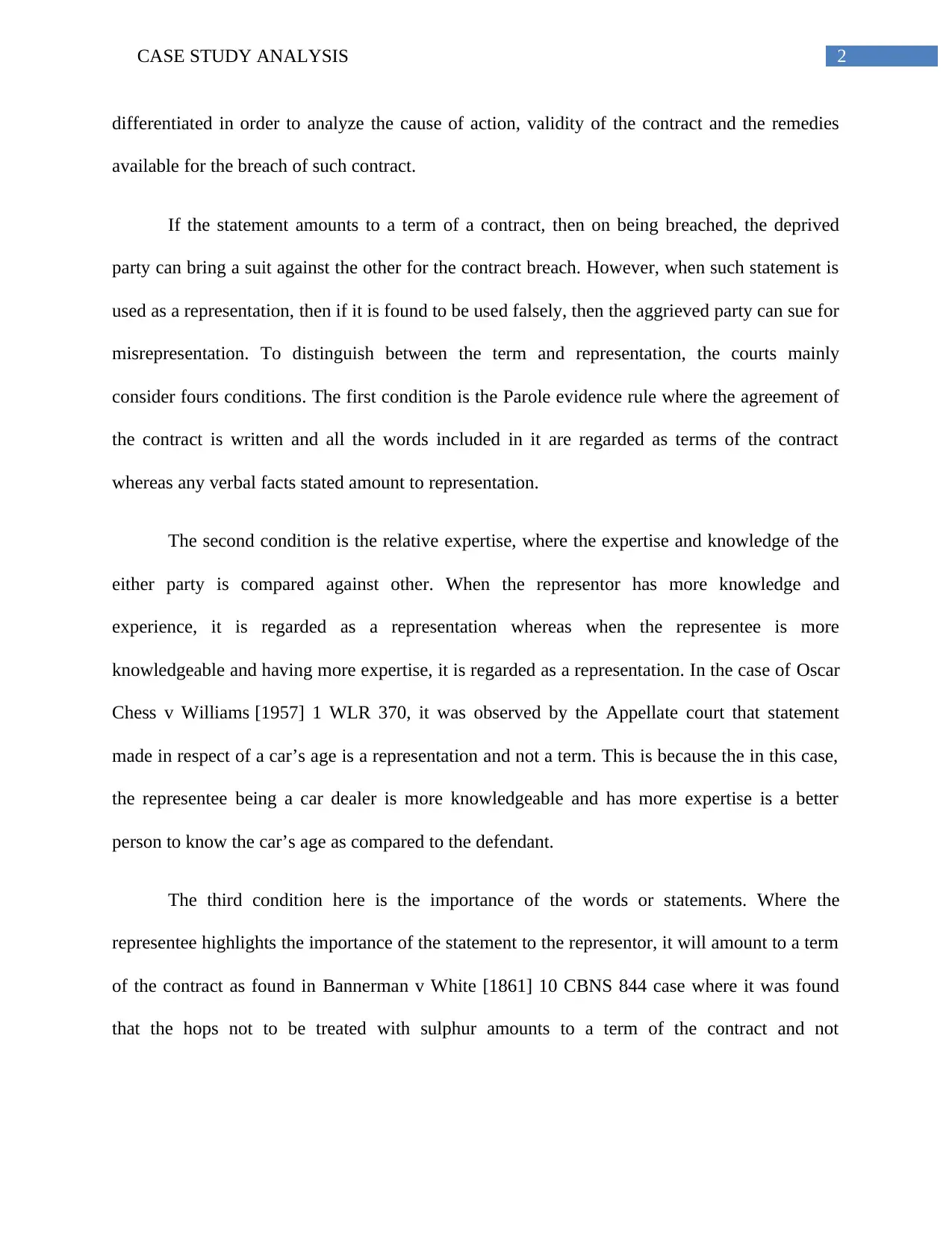
2CASE STUDY ANALYSIS
differentiated in order to analyze the cause of action, validity of the contract and the remedies
available for the breach of such contract.
If the statement amounts to a term of a contract, then on being breached, the deprived
party can bring a suit against the other for the contract breach. However, when such statement is
used as a representation, then if it is found to be used falsely, then the aggrieved party can sue for
misrepresentation. To distinguish between the term and representation, the courts mainly
consider fours conditions. The first condition is the Parole evidence rule where the agreement of
the contract is written and all the words included in it are regarded as terms of the contract
whereas any verbal facts stated amount to representation.
The second condition is the relative expertise, where the expertise and knowledge of the
either party is compared against other. When the representor has more knowledge and
experience, it is regarded as a representation whereas when the representee is more
knowledgeable and having more expertise, it is regarded as a representation. In the case of Oscar
Chess v Williams [1957] 1 WLR 370, it was observed by the Appellate court that statement
made in respect of a car’s age is a representation and not a term. This is because the in this case,
the representee being a car dealer is more knowledgeable and has more expertise is a better
person to know the car’s age as compared to the defendant.
The third condition here is the importance of the words or statements. Where the
representee highlights the importance of the statement to the representor, it will amount to a term
of the contract as found in Bannerman v White [1861] 10 CBNS 844 case where it was found
that the hops not to be treated with sulphur amounts to a term of the contract and not
differentiated in order to analyze the cause of action, validity of the contract and the remedies
available for the breach of such contract.
If the statement amounts to a term of a contract, then on being breached, the deprived
party can bring a suit against the other for the contract breach. However, when such statement is
used as a representation, then if it is found to be used falsely, then the aggrieved party can sue for
misrepresentation. To distinguish between the term and representation, the courts mainly
consider fours conditions. The first condition is the Parole evidence rule where the agreement of
the contract is written and all the words included in it are regarded as terms of the contract
whereas any verbal facts stated amount to representation.
The second condition is the relative expertise, where the expertise and knowledge of the
either party is compared against other. When the representor has more knowledge and
experience, it is regarded as a representation whereas when the representee is more
knowledgeable and having more expertise, it is regarded as a representation. In the case of Oscar
Chess v Williams [1957] 1 WLR 370, it was observed by the Appellate court that statement
made in respect of a car’s age is a representation and not a term. This is because the in this case,
the representee being a car dealer is more knowledgeable and has more expertise is a better
person to know the car’s age as compared to the defendant.
The third condition here is the importance of the words or statements. Where the
representee highlights the importance of the statement to the representor, it will amount to a term
of the contract as found in Bannerman v White [1861] 10 CBNS 844 case where it was found
that the hops not to be treated with sulphur amounts to a term of the contract and not
⊘ This is a preview!⊘
Do you want full access?
Subscribe today to unlock all pages.

Trusted by 1+ million students worldwide
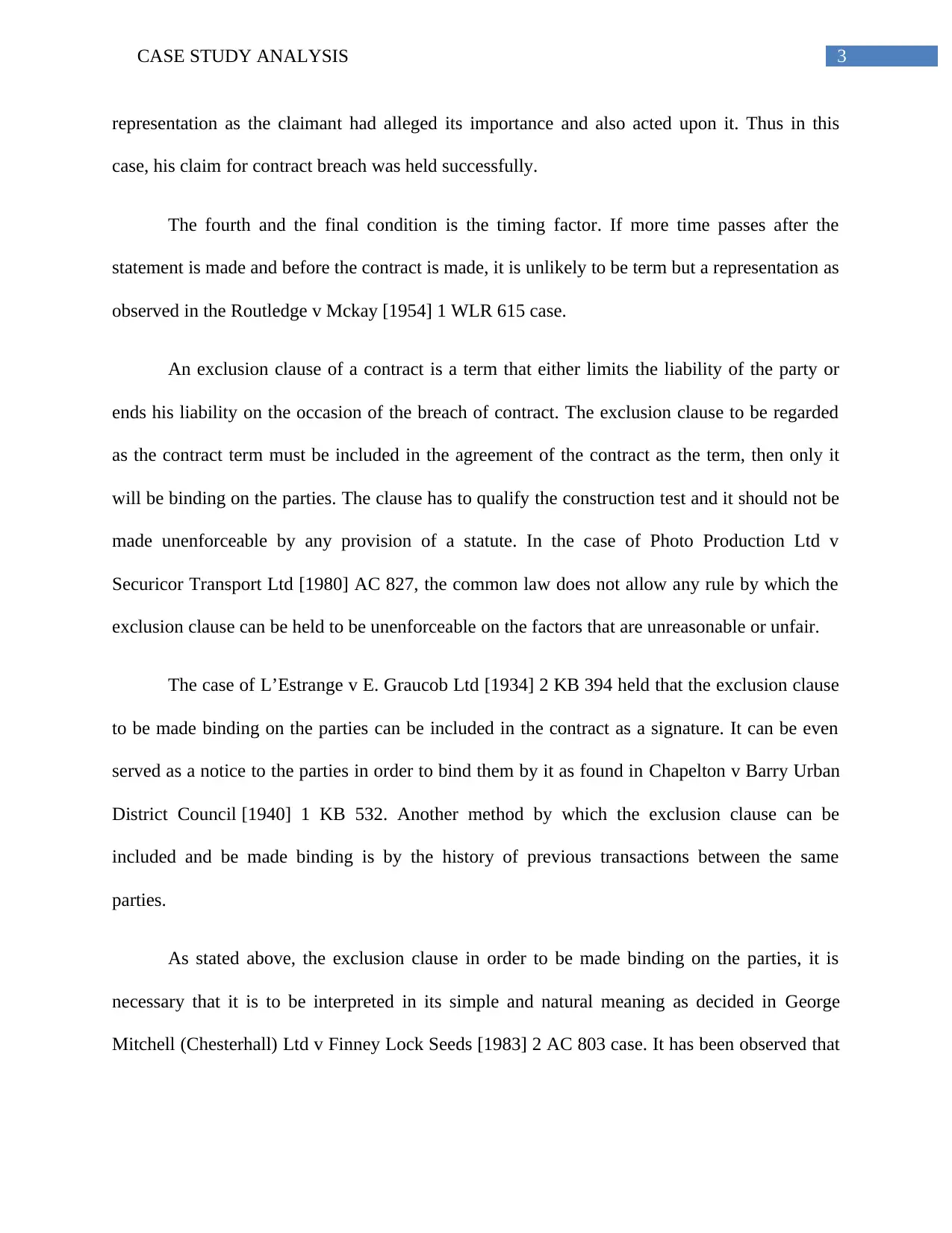
3CASE STUDY ANALYSIS
representation as the claimant had alleged its importance and also acted upon it. Thus in this
case, his claim for contract breach was held successfully.
The fourth and the final condition is the timing factor. If more time passes after the
statement is made and before the contract is made, it is unlikely to be term but a representation as
observed in the Routledge v Mckay [1954] 1 WLR 615 case.
An exclusion clause of a contract is a term that either limits the liability of the party or
ends his liability on the occasion of the breach of contract. The exclusion clause to be regarded
as the contract term must be included in the agreement of the contract as the term, then only it
will be binding on the parties. The clause has to qualify the construction test and it should not be
made unenforceable by any provision of a statute. In the case of Photo Production Ltd v
Securicor Transport Ltd [1980] AC 827, the common law does not allow any rule by which the
exclusion clause can be held to be unenforceable on the factors that are unreasonable or unfair.
The case of L’Estrange v E. Graucob Ltd [1934] 2 KB 394 held that the exclusion clause
to be made binding on the parties can be included in the contract as a signature. It can be even
served as a notice to the parties in order to bind them by it as found in Chapelton v Barry Urban
District Council [1940] 1 KB 532. Another method by which the exclusion clause can be
included and be made binding is by the history of previous transactions between the same
parties.
As stated above, the exclusion clause in order to be made binding on the parties, it is
necessary that it is to be interpreted in its simple and natural meaning as decided in George
Mitchell (Chesterhall) Ltd v Finney Lock Seeds [1983] 2 AC 803 case. It has been observed that
representation as the claimant had alleged its importance and also acted upon it. Thus in this
case, his claim for contract breach was held successfully.
The fourth and the final condition is the timing factor. If more time passes after the
statement is made and before the contract is made, it is unlikely to be term but a representation as
observed in the Routledge v Mckay [1954] 1 WLR 615 case.
An exclusion clause of a contract is a term that either limits the liability of the party or
ends his liability on the occasion of the breach of contract. The exclusion clause to be regarded
as the contract term must be included in the agreement of the contract as the term, then only it
will be binding on the parties. The clause has to qualify the construction test and it should not be
made unenforceable by any provision of a statute. In the case of Photo Production Ltd v
Securicor Transport Ltd [1980] AC 827, the common law does not allow any rule by which the
exclusion clause can be held to be unenforceable on the factors that are unreasonable or unfair.
The case of L’Estrange v E. Graucob Ltd [1934] 2 KB 394 held that the exclusion clause
to be made binding on the parties can be included in the contract as a signature. It can be even
served as a notice to the parties in order to bind them by it as found in Chapelton v Barry Urban
District Council [1940] 1 KB 532. Another method by which the exclusion clause can be
included and be made binding is by the history of previous transactions between the same
parties.
As stated above, the exclusion clause in order to be made binding on the parties, it is
necessary that it is to be interpreted in its simple and natural meaning as decided in George
Mitchell (Chesterhall) Ltd v Finney Lock Seeds [1983] 2 AC 803 case. It has been observed that
Paraphrase This Document
Need a fresh take? Get an instant paraphrase of this document with our AI Paraphraser
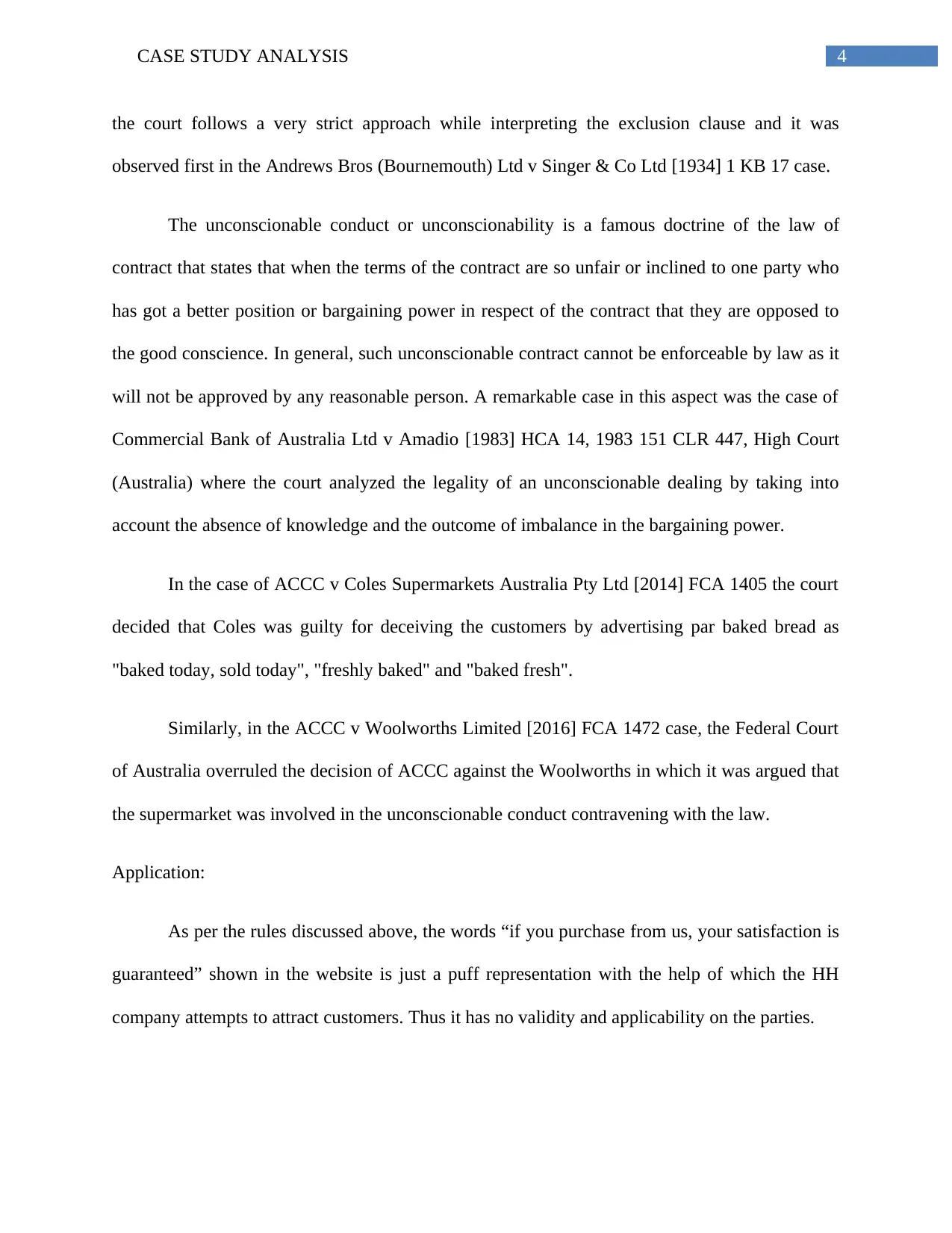
4CASE STUDY ANALYSIS
the court follows a very strict approach while interpreting the exclusion clause and it was
observed first in the Andrews Bros (Bournemouth) Ltd v Singer & Co Ltd [1934] 1 KB 17 case.
The unconscionable conduct or unconscionability is a famous doctrine of the law of
contract that states that when the terms of the contract are so unfair or inclined to one party who
has got a better position or bargaining power in respect of the contract that they are opposed to
the good conscience. In general, such unconscionable contract cannot be enforceable by law as it
will not be approved by any reasonable person. A remarkable case in this aspect was the case of
Commercial Bank of Australia Ltd v Amadio [1983] HCA 14, 1983 151 CLR 447, High Court
(Australia) where the court analyzed the legality of an unconscionable dealing by taking into
account the absence of knowledge and the outcome of imbalance in the bargaining power.
In the case of ACCC v Coles Supermarkets Australia Pty Ltd [2014] FCA 1405 the court
decided that Coles was guilty for deceiving the customers by advertising par baked bread as
"baked today, sold today", "freshly baked" and "baked fresh".
Similarly, in the ACCC v Woolworths Limited [2016] FCA 1472 case, the Federal Court
of Australia overruled the decision of ACCC against the Woolworths in which it was argued that
the supermarket was involved in the unconscionable conduct contravening with the law.
Application:
As per the rules discussed above, the words “if you purchase from us, your satisfaction is
guaranteed” shown in the website is just a puff representation with the help of which the HH
company attempts to attract customers. Thus it has no validity and applicability on the parties.
the court follows a very strict approach while interpreting the exclusion clause and it was
observed first in the Andrews Bros (Bournemouth) Ltd v Singer & Co Ltd [1934] 1 KB 17 case.
The unconscionable conduct or unconscionability is a famous doctrine of the law of
contract that states that when the terms of the contract are so unfair or inclined to one party who
has got a better position or bargaining power in respect of the contract that they are opposed to
the good conscience. In general, such unconscionable contract cannot be enforceable by law as it
will not be approved by any reasonable person. A remarkable case in this aspect was the case of
Commercial Bank of Australia Ltd v Amadio [1983] HCA 14, 1983 151 CLR 447, High Court
(Australia) where the court analyzed the legality of an unconscionable dealing by taking into
account the absence of knowledge and the outcome of imbalance in the bargaining power.
In the case of ACCC v Coles Supermarkets Australia Pty Ltd [2014] FCA 1405 the court
decided that Coles was guilty for deceiving the customers by advertising par baked bread as
"baked today, sold today", "freshly baked" and "baked fresh".
Similarly, in the ACCC v Woolworths Limited [2016] FCA 1472 case, the Federal Court
of Australia overruled the decision of ACCC against the Woolworths in which it was argued that
the supermarket was involved in the unconscionable conduct contravening with the law.
Application:
As per the rules discussed above, the words “if you purchase from us, your satisfaction is
guaranteed” shown in the website is just a puff representation with the help of which the HH
company attempts to attract customers. Thus it has no validity and applicability on the parties.
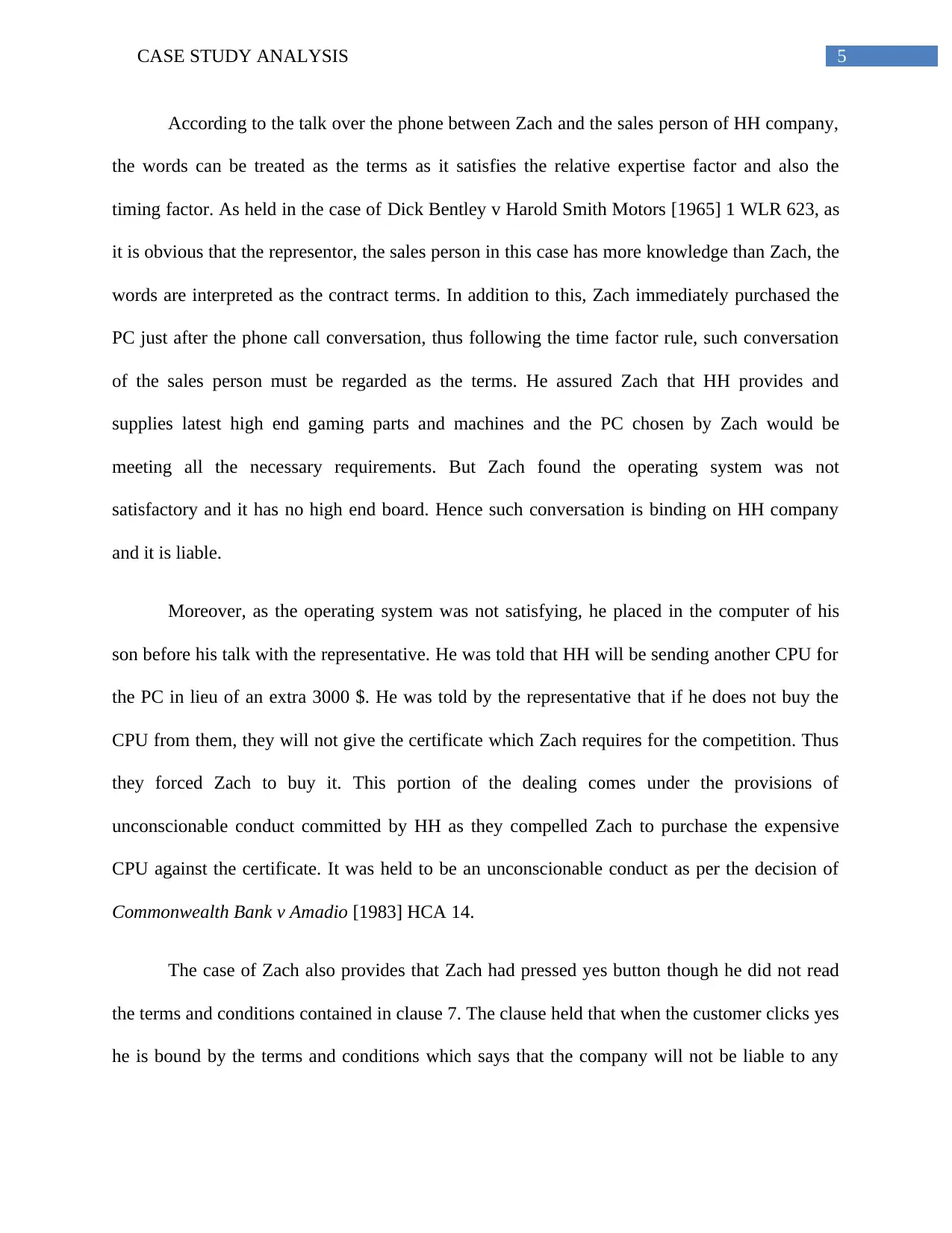
5CASE STUDY ANALYSIS
According to the talk over the phone between Zach and the sales person of HH company,
the words can be treated as the terms as it satisfies the relative expertise factor and also the
timing factor. As held in the case of Dick Bentley v Harold Smith Motors [1965] 1 WLR 623, as
it is obvious that the representor, the sales person in this case has more knowledge than Zach, the
words are interpreted as the contract terms. In addition to this, Zach immediately purchased the
PC just after the phone call conversation, thus following the time factor rule, such conversation
of the sales person must be regarded as the terms. He assured Zach that HH provides and
supplies latest high end gaming parts and machines and the PC chosen by Zach would be
meeting all the necessary requirements. But Zach found the operating system was not
satisfactory and it has no high end board. Hence such conversation is binding on HH company
and it is liable.
Moreover, as the operating system was not satisfying, he placed in the computer of his
son before his talk with the representative. He was told that HH will be sending another CPU for
the PC in lieu of an extra 3000 $. He was told by the representative that if he does not buy the
CPU from them, they will not give the certificate which Zach requires for the competition. Thus
they forced Zach to buy it. This portion of the dealing comes under the provisions of
unconscionable conduct committed by HH as they compelled Zach to purchase the expensive
CPU against the certificate. It was held to be an unconscionable conduct as per the decision of
Commonwealth Bank v Amadio [1983] HCA 14.
The case of Zach also provides that Zach had pressed yes button though he did not read
the terms and conditions contained in clause 7. The clause held that when the customer clicks yes
he is bound by the terms and conditions which says that the company will not be liable to any
According to the talk over the phone between Zach and the sales person of HH company,
the words can be treated as the terms as it satisfies the relative expertise factor and also the
timing factor. As held in the case of Dick Bentley v Harold Smith Motors [1965] 1 WLR 623, as
it is obvious that the representor, the sales person in this case has more knowledge than Zach, the
words are interpreted as the contract terms. In addition to this, Zach immediately purchased the
PC just after the phone call conversation, thus following the time factor rule, such conversation
of the sales person must be regarded as the terms. He assured Zach that HH provides and
supplies latest high end gaming parts and machines and the PC chosen by Zach would be
meeting all the necessary requirements. But Zach found the operating system was not
satisfactory and it has no high end board. Hence such conversation is binding on HH company
and it is liable.
Moreover, as the operating system was not satisfying, he placed in the computer of his
son before his talk with the representative. He was told that HH will be sending another CPU for
the PC in lieu of an extra 3000 $. He was told by the representative that if he does not buy the
CPU from them, they will not give the certificate which Zach requires for the competition. Thus
they forced Zach to buy it. This portion of the dealing comes under the provisions of
unconscionable conduct committed by HH as they compelled Zach to purchase the expensive
CPU against the certificate. It was held to be an unconscionable conduct as per the decision of
Commonwealth Bank v Amadio [1983] HCA 14.
The case of Zach also provides that Zach had pressed yes button though he did not read
the terms and conditions contained in clause 7. The clause held that when the customer clicks yes
he is bound by the terms and conditions which says that the company will not be liable to any
⊘ This is a preview!⊘
Do you want full access?
Subscribe today to unlock all pages.

Trusted by 1+ million students worldwide
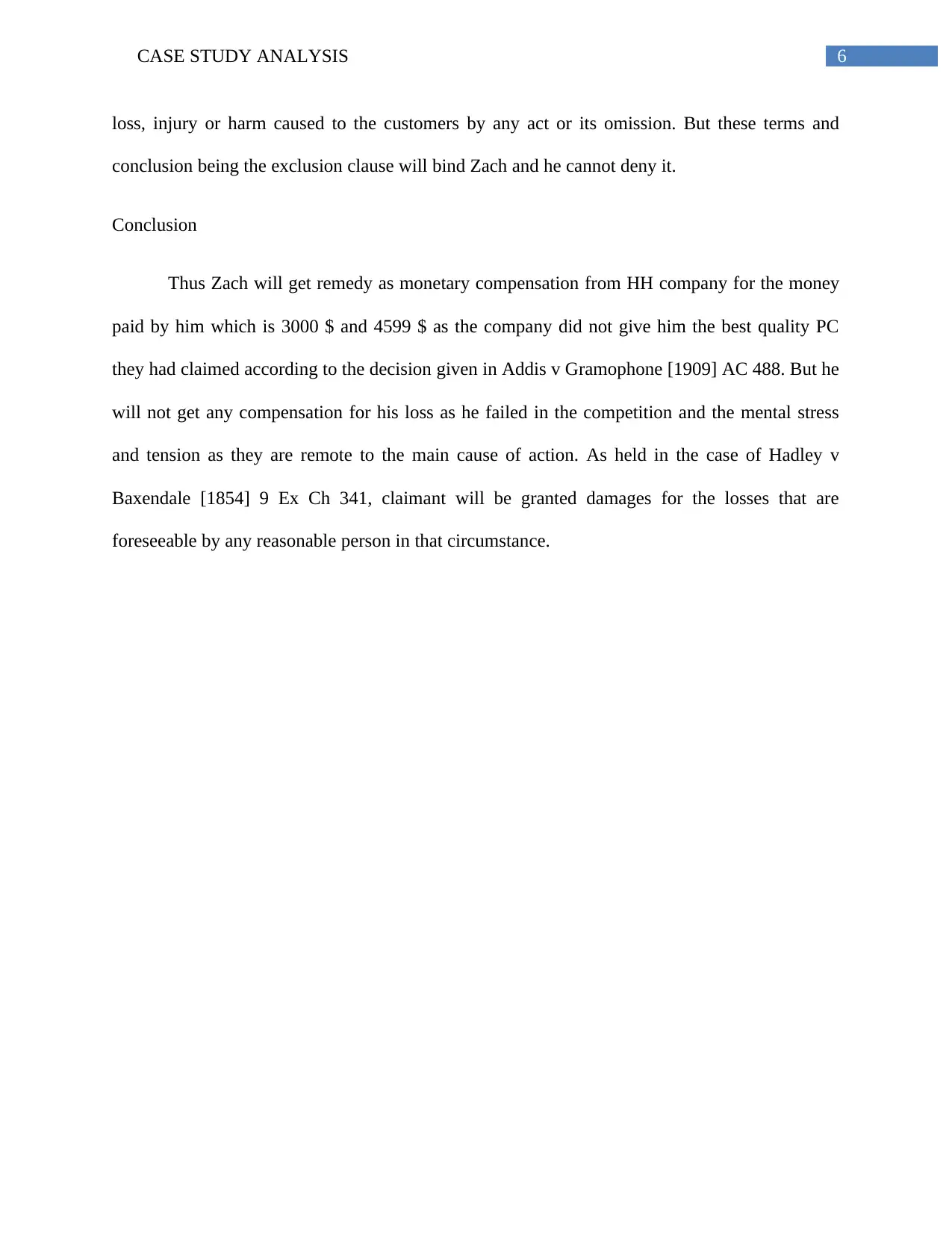
6CASE STUDY ANALYSIS
loss, injury or harm caused to the customers by any act or its omission. But these terms and
conclusion being the exclusion clause will bind Zach and he cannot deny it.
Conclusion
Thus Zach will get remedy as monetary compensation from HH company for the money
paid by him which is 3000 $ and 4599 $ as the company did not give him the best quality PC
they had claimed according to the decision given in Addis v Gramophone [1909] AC 488. But he
will not get any compensation for his loss as he failed in the competition and the mental stress
and tension as they are remote to the main cause of action. As held in the case of Hadley v
Baxendale [1854] 9 Ex Ch 341, claimant will be granted damages for the losses that are
foreseeable by any reasonable person in that circumstance.
loss, injury or harm caused to the customers by any act or its omission. But these terms and
conclusion being the exclusion clause will bind Zach and he cannot deny it.
Conclusion
Thus Zach will get remedy as monetary compensation from HH company for the money
paid by him which is 3000 $ and 4599 $ as the company did not give him the best quality PC
they had claimed according to the decision given in Addis v Gramophone [1909] AC 488. But he
will not get any compensation for his loss as he failed in the competition and the mental stress
and tension as they are remote to the main cause of action. As held in the case of Hadley v
Baxendale [1854] 9 Ex Ch 341, claimant will be granted damages for the losses that are
foreseeable by any reasonable person in that circumstance.
Paraphrase This Document
Need a fresh take? Get an instant paraphrase of this document with our AI Paraphraser
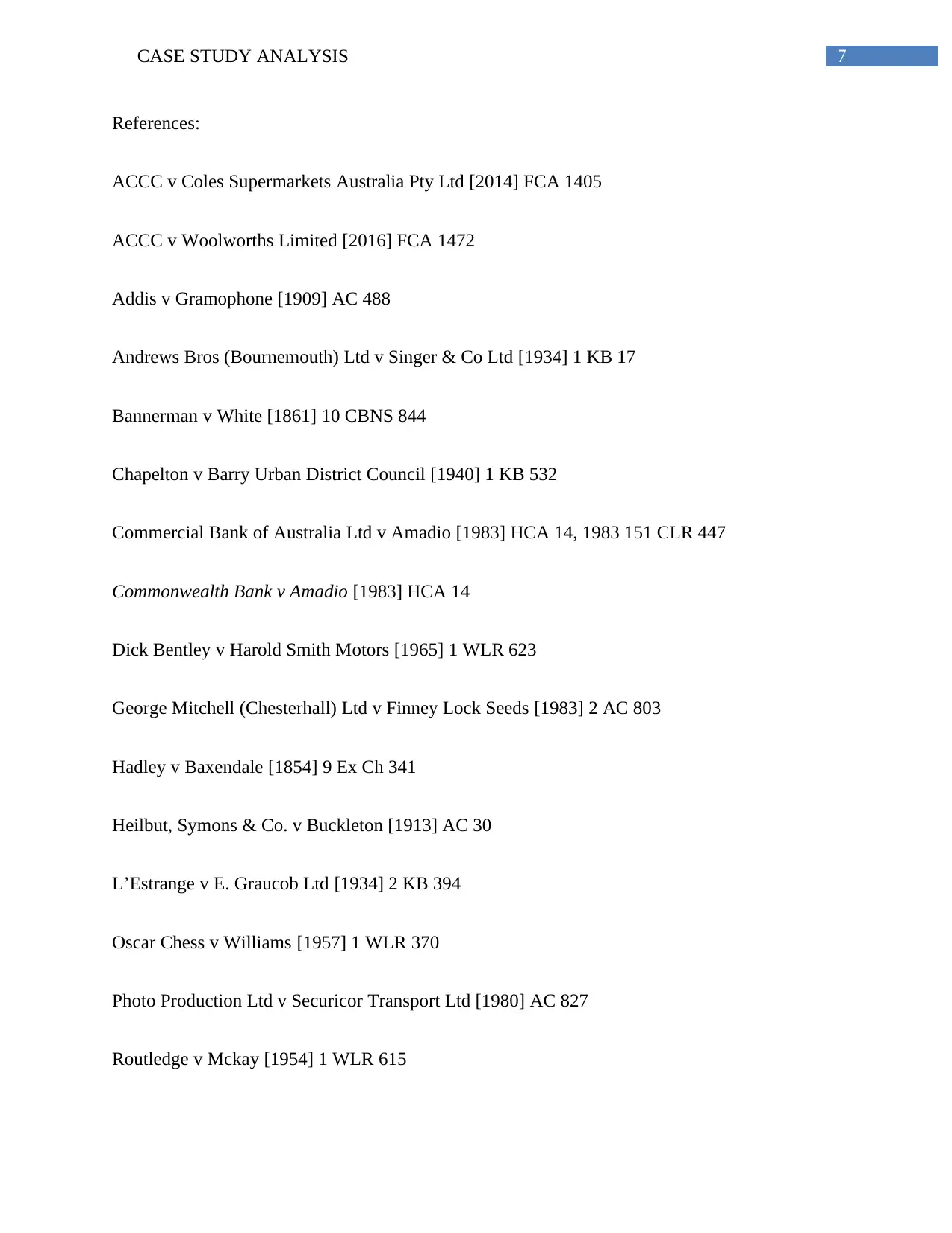
7CASE STUDY ANALYSIS
References:
ACCC v Coles Supermarkets Australia Pty Ltd [2014] FCA 1405
ACCC v Woolworths Limited [2016] FCA 1472
Addis v Gramophone [1909] AC 488
Andrews Bros (Bournemouth) Ltd v Singer & Co Ltd [1934] 1 KB 17
Bannerman v White [1861] 10 CBNS 844
Chapelton v Barry Urban District Council [1940] 1 KB 532
Commercial Bank of Australia Ltd v Amadio [1983] HCA 14, 1983 151 CLR 447
Commonwealth Bank v Amadio [1983] HCA 14
Dick Bentley v Harold Smith Motors [1965] 1 WLR 623
George Mitchell (Chesterhall) Ltd v Finney Lock Seeds [1983] 2 AC 803
Hadley v Baxendale [1854] 9 Ex Ch 341
Heilbut, Symons & Co. v Buckleton [1913] AC 30
L’Estrange v E. Graucob Ltd [1934] 2 KB 394
Oscar Chess v Williams [1957] 1 WLR 370
Photo Production Ltd v Securicor Transport Ltd [1980] AC 827
Routledge v Mckay [1954] 1 WLR 615
References:
ACCC v Coles Supermarkets Australia Pty Ltd [2014] FCA 1405
ACCC v Woolworths Limited [2016] FCA 1472
Addis v Gramophone [1909] AC 488
Andrews Bros (Bournemouth) Ltd v Singer & Co Ltd [1934] 1 KB 17
Bannerman v White [1861] 10 CBNS 844
Chapelton v Barry Urban District Council [1940] 1 KB 532
Commercial Bank of Australia Ltd v Amadio [1983] HCA 14, 1983 151 CLR 447
Commonwealth Bank v Amadio [1983] HCA 14
Dick Bentley v Harold Smith Motors [1965] 1 WLR 623
George Mitchell (Chesterhall) Ltd v Finney Lock Seeds [1983] 2 AC 803
Hadley v Baxendale [1854] 9 Ex Ch 341
Heilbut, Symons & Co. v Buckleton [1913] AC 30
L’Estrange v E. Graucob Ltd [1934] 2 KB 394
Oscar Chess v Williams [1957] 1 WLR 370
Photo Production Ltd v Securicor Transport Ltd [1980] AC 827
Routledge v Mckay [1954] 1 WLR 615
1 out of 8
Related Documents
Your All-in-One AI-Powered Toolkit for Academic Success.
+13062052269
info@desklib.com
Available 24*7 on WhatsApp / Email
![[object Object]](/_next/static/media/star-bottom.7253800d.svg)
Unlock your academic potential
Copyright © 2020–2025 A2Z Services. All Rights Reserved. Developed and managed by ZUCOL.





